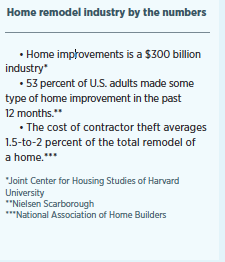The process of renovating your home or building a home addition is inevitably stressful, particularly when multiple contractors are involved. Due to the complexity of these projects, homeowners are exposed to many new risks that often seem out of their control.
Owners of high-value, custom homes, moreover, may be at additional risk since the cost of rebuilding the home often exceeds contractors’ insurance limits.
So, what can be done to mitigate these risks? One of the easiest ways is to let your insurance broker know what you are planning to do before construction starts. Most high net worth clients enjoy homeowners policies that are likely to cover a loss by paying the full replacement cost.
However, this generous provision comes with a requirement that the homeowner notify his or her insurance broker of any renovations or any scenario that requires the homeowner to move out during the renovation project. This is important: Failing to notify the broker may result in larger deductibles, or even policy limitations, if a loss occurs.
The process of renovating your home or building a home addition is inevitably stressful.
Another way to mitigate risk is to choose qualified, licensed contractors who have been vetted by state licensing bureaus and the Better Business Bureau. Doing a little research on the front end and selecting a qualified contractor can help to ensure your project progresses smoothly.
Once construction has started, it is important to ensure worksite safety for your family as well as the contractors. Examples of safety measures include the requirement that all flammable liquids be stored in approved containers, that fire extinguishers be in place throughout the home and that alarm or fire sprinkler systems remain functional throughout the project’s duration.
In addition, diligently locking up valuables, such as jewelry and cash, will protect your assets and your contractors’ liabilities.
Other considerations need to be made for larger construction projects, such as home additions. Insurance companies may require a course of construction endorsement to a current homeowners policy, but this depends on a number of criteria, including the project’s time line, complexity and cost. In addition, occupancy, contractor experience and risk mitigation methods may be factors insurance companies consider.
After the project has been completed, a homeowner should close the loop by contacting his or her insurance broker to make the appropriate adjustments to the policy. In some cases, insurance carriers that cater to high net worth families will send an expert to the renovated home to provide an accurate estimate of the amount it would take to rebuild.
Remaining diligent throughout the process of renovating a home requires more up-front planning, but the peace of mind it provides will be worth the effort.

This article was originally published in the February–April 2017 issue of Worth.
















